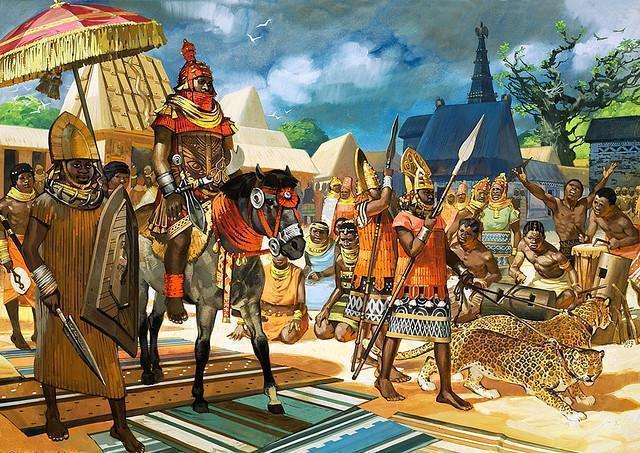
10 Factors Affecting Inter-group Relations In Nigeria
Inter-group relations in Nigeria refer to the interactions and relationships between different ethnic, religious, and linguistic groups within the country. Nigeria is a diverse nation with over 250 ethnic groups and over 500 languages spoken. The major ethnic groups include the Hausa-Fulani, Yoruba, and Igbo, with smaller groups such as the Kanuri, Tiv, and Edo also present. Historically, inter-group relations in Nigeria have been marked by tension and conflict, particularly between the various ethnic groups and religious groups. However, there have also been instances of cooperation and unity among the different groups. In recent years, issues such as resource distribution, political representation, and religious extremism have continued to fuel inter-group tensions in Nigeria.Factors Affecting Inter-group Relations In Nigeria
Read Also: 10 Factors Affecting Press Freedom in Nigeria
👉 Relocate to Canada Today!
Live, Study and Work in Canada. No Payment is Required! Hurry Now click here to Apply >> Immigrate to CanadaWhat are Inter-group Relations?
Inter-group relations refer to the interactions and relationships between different groups of people, such as different racial or ethnic groups, socioeconomic groups, or religious groups. This can include both positive and negative interactions and can impact the well-being and opportunities of individuals within those groups. Inter-group relations can also refer to how different groups are represented and treated in society, such as in media, politics, and education.“It’s no longer news, you are the one just hearing” – Portable’s alleged new babymama, Ashabi finally speaks
Types of Inter-group Relations in Nigeria
There are several types of inter-group relations in Nigeria, including:
- Ethnic Relations: Nigeria is a culturally diverse country, with over 250 ethnic groups. Relations between these groups can be complex, with historical tensions and ongoing conflicts over land and resources.
- Religious Relations: Nigeria has a large Muslim population in the north and a large Christian population in the south. These religious groups have sometimes conflicted, particularly in the northern states.
- Political Relations: Nigeria has a history of political instability, with ethnic and religious groups competing for power and resources. This has led to tensions and conflicts between different groups.
- Economic Relations: Nigeria’s economy is heavily dependent on its oil resources, which are concentrated in certain regions of the country. This has led to economic disparities between different regions and groups and has contributed to tensions and conflicts. .Information Guide Nigeria
- Social Relations: Nigeria is a complex and diverse society, with many different languages, customs, and traditions. This diversity can lead to misunderstandings and conflicts between different groups, particularly in urban areas where different groups are more likely to come into contact with one another.
Read Also: 10 Factors that Influences Nationalist Activities in Nigeria
Advantages of Inter-group Relations in Nigeria
There are several advantages to inter-group relations in Nigeria, including:
- Economic Benefits: Inter-group relations can lead to increased trade and business opportunities, which can boost the economy and create jobs.
- Cultural Exchange: Interacting with people from different groups can lead to a greater understanding and appreciation of different cultures and ways of life.
- Political Stability: Good inter-group relations can contribute to political stability and reduce the likelihood of conflict.
- Conflict Resolution: Inter-group relations can help to facilitate dialogue and negotiation, which can be useful in resolving conflicts.
- Improved Governance and Public Service Delivery: Inter-group relations can lead to the inclusion of diverse perspectives, which can improve governance and public service delivery.
Read Also: 10 Factors that least Influence Population Density in Nigeria
Inter-group Relations and the Nigerian Society
Nigeria is a country located in West Africa that is made up of over 250 ethnic groups. The largest ethnic groups are the Hausa, Yoruba, and Igbo. Historically, these groups have had complex relationships with one another, with periods of cooperation and conflict.Bad news as England sack another club manager
Precolonial Nigeria was made up of a diverse set of ethnic groups with their own distinct cultures and political systems. The Hausa, Yoruba, and Igbo were the largest ethnic groups, each with their kingdoms and empires.
During the colonial period, the British imposed a centralized administration on Nigeria, which led to increased contact and interaction between the different ethnic groups. This also led to the rise of a Nigerian national identity, although ethnic identities remained strong.Romantic Love Messages
👉 Relocate to Canada Today!
Live, Study and Work in Canada. No Payment is Required! Hurry Now click here to Apply >> Immigrate to CanadaAfter Nigeria gained independence in 1960, ethnic and religious tensions began to rise. The country was ruled by a series of military dictators, which further exacerbated these tensions. In the late 1960s, ethnic and religious violence broke out, leading to the Biafra War (1967-1970), a civil war fought mainly by the Igbo people who sought to secede from Nigeria. The war resulted in the deaths of over one million people.
Since the return to civilian rule in 1999, there have been many efforts to address ethnic and religious tensions in Nigeria, but conflicts continue to occur. The country continues to face issues such as ethnic and religious violence, corruption, and economic inequality.
Read Also: 9 Factors Affecting Fish Farming in Nigeria
Factors affecting Inter-group Relations in Nigeria
Several factors affect inter-group relations in Nigeria, including:JAMB Portal
- Ethnic and Religious Diversity: Nigeria is a multi-ethnic and multi-religious country, with over 250 ethnic groups and over 50 languages spoken. This diversity leads to tensions between different groups.
- Historical Grievances: Many ethnic groups in Nigeria have long-standing historical grievances, such as marginalization, exploitation, or violence, which can contribute to inter-group tensions.
- Economic Disparities: Nigeria is a country with a high level of economic inequality, with a small elite controlling much of the wealth. This leads to feelings of resentment and mistrust between different economic classes.
- Political Manipulation: Political leaders in Nigeria have been known to manipulate ethnic and religious differences for their gain, which can exacerbate inter-group tensions.
- Lack of Education: A lack of education can contribute to misunderstandings and stereotypes between different groups, and it simply makes it more difficult for people to communicate and work together.
- Lack of Trust in Government: The Nigerian government has a history of corruption and mismanagement, which leads to a lack of trust in government institutions and a lack of faith in the political process.
- Media Bias: The media in Nigeria can be biased in its coverage of inter-group relations, which can contribute to misunderstandings and mistrust between different groups.
- Natural Resources: Nigeria is a country rich in natural resources, such as oil and gas, which can be a source of conflict between different groups competing for control over these resources.
- Immigration: Nigeria has a large number of immigrants, both legal and illegal, which leads to tensions between different groups over issues such as jobs and housing.Good Morning Love Message
- Socio-economic and Political Instability: Nigeria has experienced a lot of political and socio-economic instability in recent years, which also contributes to inter-group tensions as people struggle to survive in difficult conditions.
Read Also: 10 Factors That Influence The Stability of Marriage in Nigeria
Conclusion
Inter-group relations in Nigeria are complex and have been a source of tension throughout the country’s history. The diversity of ethnic groups in the country has led to conflicts over land, resources, and political power. Despite efforts to promote unity, deep-seated issues still exist and much work needs to be done to improve inter-group relations in Nigeria.NYSC Portal
heck JAMB RESULT
Check and Confirm: How much is Dollar to Naira







